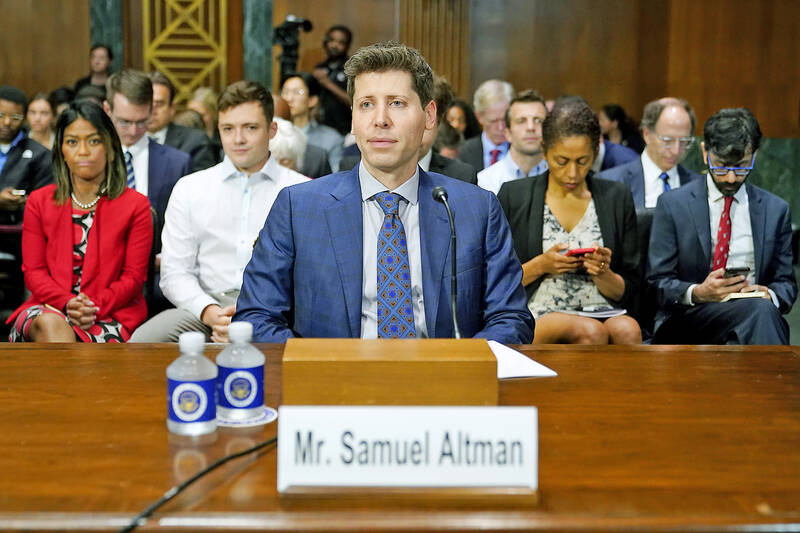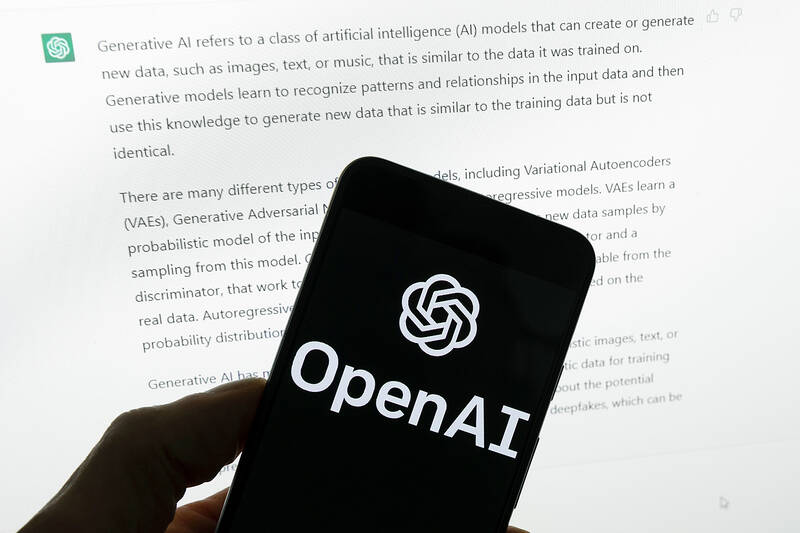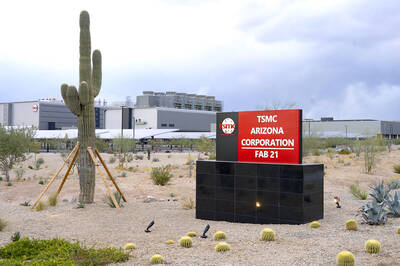An influential Silicon Valley presence for more than a decade, OpenAI CEO Sam Altman is emerging as the tech titan of the AI age, riding the wave of ChatGPT, the bot his company unleashed on the world.
Altman testified Tuesday to a US Senate Judiciary Committee panel and said artificial intelligence could be at a “printing press” moment, which would make him one of its main pioneers.
In 2015, Altman joined Tesla chief Elon Musk and others in starting OpenAI, a research company with a stated goal of building generative AI that benefits humanity.

Photo: AP
“The technological progress we make in the next 100 years will be far larger than all we’ve made since we first controlled fire and invented the wheel,” Altman said in a 2021 blog post.
STARTUP GURU
Born in 1985 into a Jewish family, Altman grew up in a St. Louis suburb, where he got his first computer at the age of eight, according to a long profile in the New Yorker from 2016.

Photo: AP
Computers and the access to online community they enable helped him navigate being gay in a conservative part of the country, Altman said in an interview with Esquire.
Like so many tech figures before him, Altman dropped out of Stanford University to start a company, Loopt, which let smartphone users selectively share their whereabouts.
Loopt was acquired in 2012 in a deal valued at US$43.4 million — and Altman’s place in Silicon Valley was secured.
Altman took a year off during which he “read many dozens of textbooks; I learned about the fields that I had been interested in,” the San Francisco resident wrote in a post.
He told of learning about nuclear engineering, synthetic biology, investing and AI.
“The seeds were planted for things that worked in deep ways later,” he said.
T-SHIRTS AND SHORTS
In 2014, Altman became president of Y Combinator, an “accelerator” that provides startups with guidance and funding in exchange for stakes in the young companies.
Altman expanded Y Combinator’s strategy for investing beyond software startups to biotech, energy, and other fields.
“He thinks quickly and talks quickly; intense, but in a good way,” said Industrial Microbes founder Derek Greenfield, who met Altman while his biotech startup was getting backing from Y Combinator.
Greenfield recalled Altman always dressing casually, sometimes in a T-shirt and shorts.
“He was very down to earth,” Greenfield said.
Altman left Y Combinator, putting his energy into artificial intelligence despite feared risks.
“He’s a very deep thinker who is incredibly focused on getting things right,” Insider Intelligence senior director of marketing and commerce Jeremy Goldman said.
Altman backed a “United Slate” political project in 2018 aimed at improving housing and healthcare policy.
He also held a fundraising event for 2020 US presidential candidate Andrew Yang, who advocated for universal basic income.
Yang “had some ideas about universal basic income that (he said) everybody needed, in part because AI was going to take the people’s jobs,” Goldman said.
Altman has proposed that combining artificial intelligence, robotics and cost-free energy could essentially enable machines to do all the work and provide a “basic income” to adults across society.
“A great future isn’t complicated: we need technology to create more wealth, and policy to fairly distribute it,” Altman wrote in a blog post.
“Everything necessary will be cheap, and everyone will have enough money to be able to afford it.”
‘FAST CARS AND SURVIVAL’
In the New Yorker article, Altman said he was a “prepper,” someone who has preparations and supplies in place to survive an apocalyptic disaster.
He has spoken of owning high-performance sports cars and renting planes to fly around California.
Altman said in a blog post that the last day of each December he writes a list of things he wants to accomplish in the year ahead.
His personal investments include startups working on fusion energy and human life extension.
“I’m super optimistic,” he said in a podcast with TED curator Chris Anderson.
“It’s always easy to doom scroll and think about how bad things are,” Altman added, “but the good things are really good and getting much better.”

Taiwanese chip-making giant Taiwan Semiconductor Manufacturing Co (TSMC) plans to invest a whopping US$100 billion in the US, after US President Donald Trump threatened to slap tariffs on overseas-made chips. TSMC is the world’s biggest maker of the critical technology that has become the lifeblood of the global economy. This week’s announcement takes the total amount TSMC has pledged to invest in the US to US$165 billion, which the company says is the “largest single foreign direct investment in US history.” It follows Trump’s accusations that Taiwan stole the US chip industry and his threats to impose tariffs of up to 100 percent

On a hillside overlooking Taichung are the remains of a village that never was. Half-formed houses abandoned by investors are slowly succumbing to the elements. Empty, save for the occasional explorer. Taiwan is full of these places. Factories, malls, hospitals, amusement parks, breweries, housing — all facing an unplanned but inevitable obsolescence. Urbex, short for urban exploration, is the practice of exploring and often photographing abandoned and derelict buildings. Many urban explorers choose not to disclose the locations of the sites, as a way of preserving the structures and preventing vandalism or looting. For artist and professor at NTNU and Taipei

March 10 to March 16 Although it failed to become popular, March of the Black Cats (烏貓進行曲) was the first Taiwanese record to have “pop song” printed on the label. Released in March 1929 under Eagle Records, a subsidiary of the Japanese-owned Columbia Records, the Hoklo (commonly known as Taiwanese) lyrics followed the traditional seven characters per verse of Taiwanese opera, but the instrumentation was Western, performed by Eagle’s in-house orchestra. The singer was entertainer Chiu-chan (秋蟾). In fact, a cover of a Xiamen folk song by Chiu-chan released around the same time, Plum Widow Missing Her Husband (雪梅思君), enjoyed more

Last week Elbridge Colby, US President Donald Trump’s nominee for under secretary of defense for policy, a key advisory position, said in his Senate confirmation hearing that Taiwan defense spending should be 10 percent of GDP “at least something in that ballpark, really focused on their defense.” He added: “So we need to properly incentivize them.” Much commentary focused on the 10 percent figure, and rightly so. Colby is not wrong in one respect — Taiwan does need to spend more. But the steady escalation in the proportion of GDP from 3 percent to 5 percent to 10 percent that advocates